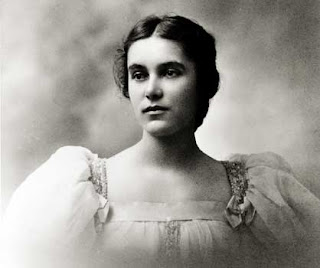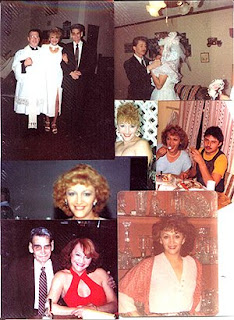Another Classic TransGriot post
 One of the ongoing arguments in the transgender community that’s guaranteed to generate heated debate one way or the other is the stealth vs out one.
One of the ongoing arguments in the transgender community that’s guaranteed to generate heated debate one way or the other is the stealth vs out one.
Basically, stealth is the transgender equivalent of what we call in the African-American community ‘passing’. Back during the bad old days African-Americans who had features and skin tones light enough to be mistaken for white would just cut ties with the African-American community and fade away into white society so they could access opportunities for a better life. It’s how Anita Hemmings in 1897 became the first African-American graduate of Vassar College 40 years before they even began admitting African-Americans.
Even though they became part of white society, they always lived in fear that someone, someday and somehow would discover their Black heritage.
The late FBI head J. Edgar Hoover’s legendary hatred of African-Americans was fueled by the fact that he was himself Black and hated his African roots.
Hmm, the self-hatred part of that sounds like Clarence Thomas and a certain group of Caucasian transwomen I’ve had run ins with.
Basically, that’s a snapshot of what living as a stealth transperson is like. They cut ties to the transgender community. If they don’t return home they’ll sometimes move hundreds or thousands of miles from their hometown to start a new life where nobody knew them in their old gender role.
Up until the early 90’s, as part of the Standards of Care, HBIGDA (the Harry Benjamin International Gender Dysphoria Association now called WPATH (the World Professional Association for Transgender Health) used to require that after surgery, a transgender person go stealth and fade into the background never to emerge.
 Many did, but recent cases like Christie Lee Littleton’s illustrate, like Anita Hemmings some of the unpleasant complications that can arise when your secret is discovered.
Many did, but recent cases like Christie Lee Littleton’s illustrate, like Anita Hemmings some of the unpleasant complications that can arise when your secret is discovered.
Contrary to the misguided opinions of some stealth peeps we out and proud folks would love nothing better than for transpeople of all stripes to simply be considered as men or women irregardless of the genitalia we arrived with on our birthday.
The reality is that we still have a long road to travel to get to that day. To get to that point requires us to educate the public on transgender issues. Some of that education comes from simply openly living our lives.
But you can’t do that education effectively if you’re hiding from the general public or won’t step up and claim that you are.
I believe that the old WPATH, then HBIGDA requirement that transgender people fade away into society is a major factor in causing many of the acceptance problems that we are grappling with now.
Those acceptance problems are especially acute in the African-American transgender community. We have to overcome not only shame and guilt issues but intolerance and transphobia from inside and outside the African-American community while also grappling with the issues that African-Americans face just living our lives.
To illustrate my belief that stealth was a hindrance to the African-American community, time to drop some more knowledge on you.
The first patient of the now closed Johns Hopkins gender program back in 1966 was an African-American transwoman from New York named Avon Wilson.
 Now, instead of her fading into the woodwork and being accidentally discovered by a New York Daily News gossip columnist in October 1966, what if she had become our Christine Jorgenson instead?
Now, instead of her fading into the woodwork and being accidentally discovered by a New York Daily News gossip columnist in October 1966, what if she had become our Christine Jorgenson instead?
Avon Wilson would have probably been covered in JET and EBONY. It’s not as far fetched as you think. EBONY until 1953 covered Chicago’s Finnie’s ball and similar events in New York. JET respectfully covered Justina Williams’ story 20 years before the AP Stylebook rules on covering transgender people were written.
We’d have a record of her existence beyond a small mention in a gossip column and she could have become the role model and icon for the next generation of African-American transpeople.
Most importantly, it would have also begun the education and discussion about transgender issues in the African-American community in the more politically friendly climate of the late 60’s-70s instead of us having to do the education in the more conservative 90’s and 2000’s.
Also, the urban legend that African-American transpeople didn’t exist would have never gained credibility because we’d have irrefutable proof we do decades earlier.
An Avon Wilson or someone else to point to as an African-American transkid would have helped me sort through some of the issues I had as a 70’s era teen and given me the courage to transition early, with the corresponding improvement in my life.
 Instead, I didn’t find out that African-American transpeople existed and wasn’t a white only thang until this JET story on Justina Williams appeared in 1979.
Instead, I didn’t find out that African-American transpeople existed and wasn’t a white only thang until this JET story on Justina Williams appeared in 1979.
I believe that earlier out role models would have resulted in and facilitated the earlier building of an African-American transgender community and more people would have had the incentive and courage to come out. You would have not only had the core group of transgender elders kicking knowledge to us younglings, we’d also have a better grasp of our history as well with more out transgender people of African descent telling their stories.
We also would have had a community that could have survived the initial onslaught of the HIV/AIDS epidemic in the 80’s instead of nearly being eviscerated by it.
 Now, just because I believe that being stealth in an Internet age is a futile stress inducing endeavor doesn’t mean that I have personal animosity or contempt for people who attempt it.
Now, just because I believe that being stealth in an Internet age is a futile stress inducing endeavor doesn’t mean that I have personal animosity or contempt for people who attempt it.
While I personally believe we need more equivalents to actress Fredi Washington in the African-American transgender community or people exhibiting the courage that Isis has shown while competing on this current cycle of America’s Next Top Model, I understand and have no problem accepting the fact that some people do it for security or various reasons.
Just as I ask that you respect myself and others for being out and proud, I respect the decision that you’ve made for your life.
I have classy girlfriends who are stealth transwomen of African descent who are beautiful inside and out, are proud of being transgender and unlike some of the WWBT’s, want all transgender people to have civil rights coverage.
 But at the same time I get a little sick of the shade that comes from some stealth transpeople (predominately WWBT’s) who are quick to holler that their exclusionary, racist, surgery-only mantra is the only true path to manhood or womanhood if your body doesn’t match your gender identity. They also erroneously assert that anyone who proudly embraces their transgender status isn’t in their eyes a man or woman, or their bullshit lie reminiscent of the nasty crap radical feminists say about transwomen, that we’re ‘oppressing’ them.
But at the same time I get a little sick of the shade that comes from some stealth transpeople (predominately WWBT’s) who are quick to holler that their exclusionary, racist, surgery-only mantra is the only true path to manhood or womanhood if your body doesn’t match your gender identity. They also erroneously assert that anyone who proudly embraces their transgender status isn’t in their eyes a man or woman, or their bullshit lie reminiscent of the nasty crap radical feminists say about transwomen, that we’re ‘oppressing’ them.
Yes, you can claim both. You can have degrees of disclosure up to and including keeping your T-business and surgical status to yourself. You can be proud of being a transperson. Being transgender doesn’t make you any less a man or woman.
But looking at my people’s history in terms of passing, I still think pushing stealth was a mistake.